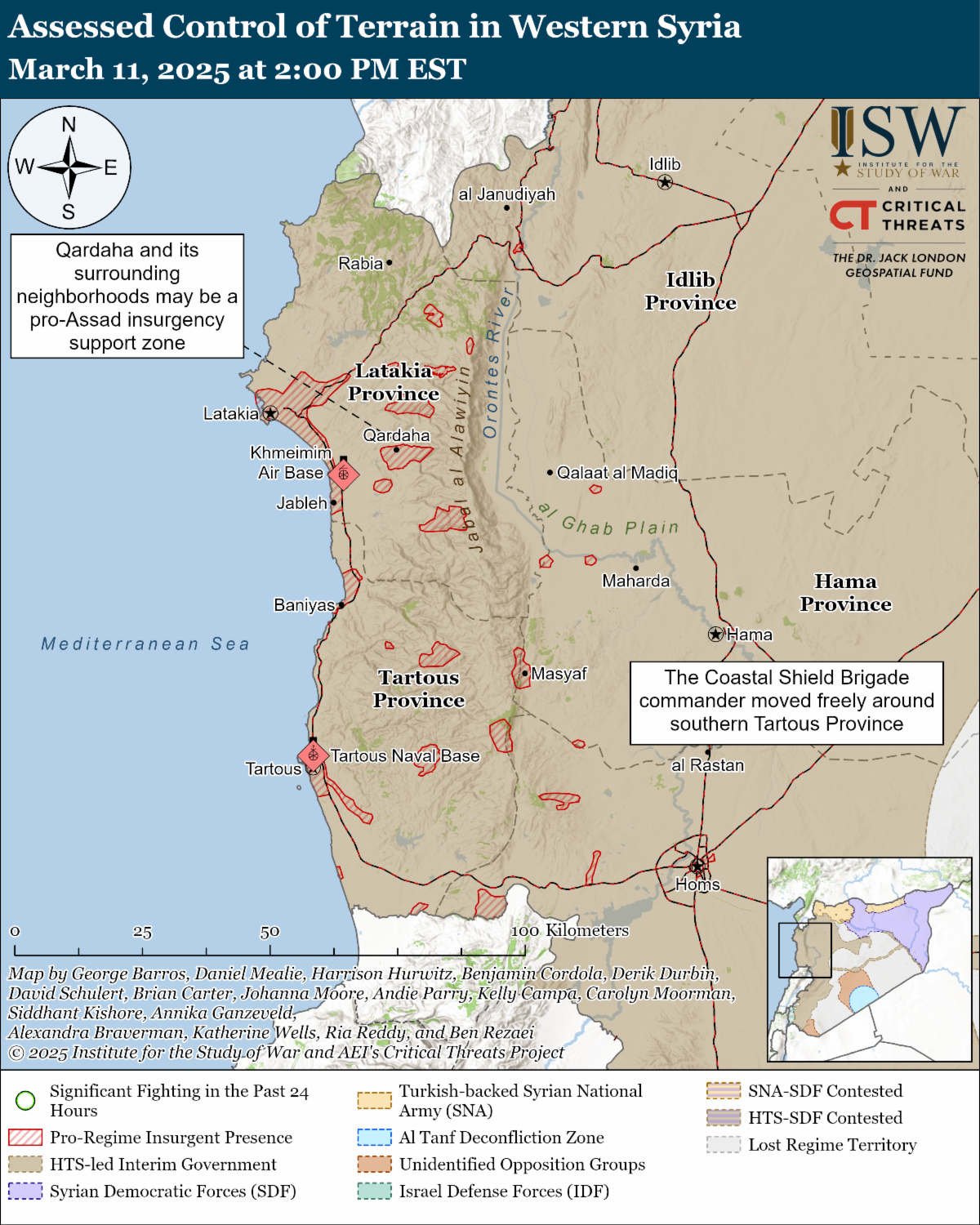The Syrian interim government has taken initial steps to prosecute individuals who committed crimes during recent insurgent activity in western Syria between March 6 and 10. Interim government forces arrested five individuals on March 11 for committing extrajudicial killings. Syrian Interim President Ahmed al Shara acknowledged accusations that interim government-affiliated forces committed extrajudicial killings and promised that the interim government would hold those who “exceeded the powers of the state” accountable during a speech on March 9. Interim government raids targeting former Assad regime members since December 2024 have fueled reports of revenge-based attacks and harassment, particularly against the Alawite community. The interim government will need to take concrete action and ensure a fair legal process, including charging, prosecuting, and sentencing perpetrators of sectarian violence, in order to demonstrate that the state is willing and able to protect minority communities. Prosecuting perpetrators of sectarian violence will enable the interim government to restore trust among Syrians, particularly Alawites, and could undercut any insurgent recruitment efforts.
Pro-Assad insurgent cells remain active in western Syria following the conclusion of interim government clearing operations. The commander of the pro-Assad Coastal Shield Brigade, Mikdad Fatiha, posted a video of himself traveling near Safita Dam, Tartus Province. Fatiha‘s ability to move relatively freely in Syrian coastal areas demonstrates that insurgents feel relatively safe moving around the countryside by road and do not fear government patrols or checkpoints. Checkpoints are commonly established on major roads and not on small roads and trails that local fighters may be aware of and can use to bypass checkpoints. Static checkpoints also do not destroy an insurgent force and usually fail to protect civilian populations.
Qardaha and its surrounding neighborhoods may be support zones for the pro-Assad insurgency. Interim government forces evacuated residents from Salata, Latakia Province, on March 11 following intense fighting between pro-Assad fighters and interim government forces in the area. Salata is around two kilometers west of Qardaha, which is Bashar al Assad’s hometown and a former Assad regime stronghold. Former Assad regime members have conducted periodic attacks targeting interim government forces since at least January 2025. Qardaha residents demonstrated against interim government forces operating in Qardaha and called for their removal prior to the recent outbreak of violence between March 6 and 10, which suggests that the population may be sympathetic to pro-Assad insurgent cells and support their activity. Insurgents in Qardaha fled to nearby hills on March 7 after interim government forces began clearing operations in the area. Insurgents may draw away resources from the town and intimidate locals to prevent them from cooperating with security forces.
Iran appears to be growing increasingly frustrated with Turkey’s influence in Syria and Turkish regional policy. Iranian media circulated reports that claimed that Turkey interfered in Syrian affairs and condoned the killing of Alawites. An outlet linked to the Islamic Propaganda Organization claimed that the Syrian interim government is a Turkish proxy. Iran views Turkey’s influence in Syria as a threat to its long-standing strategic regional objectives. Iran and Turkey's opposing interests and policies in Syria and other parts of the region could increase fissures in the Iran-Turkey relationship.
The IDF conducted a series of airstrikes targeting military infrastructure in southern Syria on March 10 and 11. The IDF said that it struck radars, military headquarters, weapons storage facilities, and other military sites belonging to the new Syrian army. Syrian media reported that the IDF struck the new Syrian army 10th Division headquarters in Qatana, Quneitra Province. The IDF separately struck former Syrian Arab Army (SAA) military sites in Daraa, Rif Dimashq, and Suwayda provinces.
A southern Syria-based journalist reported on March 11 that the IDF operated in Saidah, Quneitra Province. Israeli forces withdrew from the area after around two hours, according to the journalist.
Key Takeaways:
- Pro-Assad Insurgency: The Syrian interim government has taken initial steps to prosecute individuals who committed crimes during recent insurgent activity in western Syria between March 6 and 10. The interim government will need to take concrete action, including charging, prosecuting, and sentencing perpetrators of sectarian violence, in order to demonstrate that the state is willing and able to protect minority communities. Pro-Assad insurgent cells remain active in western Syria following the conclusion of interim government clearing operations.
- Iranian Response to Syrian Insurgency: Iran likely seeks to exacerbate sectarian tensions in Syria to try to destabilize the Syrian interim government. Iranian media has accused the Syrian interim government of committing acts of sectarian violence. These reports focus on Syrian interim government crimes against Alawites but do not acknowledge that the recent flare-up of sectarian violence in Syria has also included sectarian killings and other extrajudicial killings perpetrated by Alawite, Assadist insurgents.
- Integration of Syrian Armed Groups: The Syrian interim government began integrating militia members from Daraa Province into the interim Defense Ministry on March 11. The militia members will join the 40th Division, which the government initially called the Southern Division. Details about the formation of this division suggest that the new Syrian Army may employ independent brigade combat teams rather than use a division-centric structure.
- Iraqi Political Fissures: Iranian-backed Shia political parties are hampering the Iraqi federal government’s efforts to prevent US sanctions on Iraq. The United States has pressured the Iraqi federal government to disarm and integrate Iranian-backed Iraqi militias into the Iraqi military establishment. Some of these militias have refused to disarm and dissolve despite warnings from the Iraqi federal government about Israeli and US economic and military consequences if the militias fail to do so.
| 




 [국방부] 최상목 대통령 권한대행, 공군사관학교 졸업 및 임관식 ...
[국방부] 최상목 대통령 권한대행, 공군사관학교 졸업 및 임관식 ...
 [ISW] 이란 업데이트, 2025년 3월 10일
[ISW] 이란 업데이트, 2025년 3월 10일